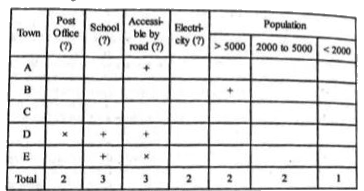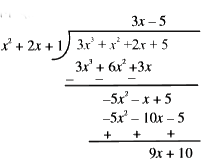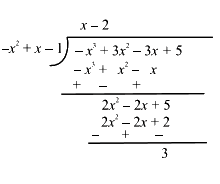There are five villages, viz. A, B, C, D and E. Two of these have post offices, three have schools and three are accessible by road. Two have populations of more than 5000 cach, two have population between 2000 and 5000 each, and one has a population of less than 2000. Two of these villages have electricity is addition to certain other facilities such as school and accessibility by road. One village with a population of less than 2000 also has a school but neither has a post office nor is accessible by road while each of the villages with a population of more than 5000 has a school, of the two villages having population between 2000 and 5000, only one has a post office and is accessible by road. A is accessible by road. B has a population of more than 5000 D has a school and is accessible by road but does not have a post office, while E has a school but is not accessible by road. C does not have a post office.
Which two villages have electricity?
A,B
B,C
B,D
C,D
The correct Answer is:C
Let us prepare a chart for the given data. A .+. sign would men a .yes. and a .x. sign would mean a .No..

Now, read the information one by one and fill up a column wherever possible. The chart given above stores the first-hand information of the problem. They are:
(i) There are 2 villages having post offices, 3 having schools, 3 accessibility to road, 2 having electricity, 2 having a population greater than 5000, 2 having population between 2000 and 5000 and 1 having a population less than 2000.
(ii) D does not have a post office, has a school and is accessible by road. E has a school and is not accessible by road. A is accessible by road while the population of B is more than 5000.
Now, let us apply other conditions of the question to the chart. Let us take them one by one.
(iii) Each village with population greater than 5000 has a school. It means that B must have a school. Put a .+. mark in the school column before B. Now, since there are only 3 schools and three .+. marks have been obtained in the school column, it means that the other two villages A and C do not have schools. Now, there is one more village having population more than 5000, and this too has a school. Apart from 15 there is only one village which has a school. This has a population 1 less than 2000 but it neither has a post office nor is accessible by road. But we see that D has a school and is accessible by road. So, the only other village having a school, le, E should be the one which has a population of less than 2000, has a school but neither Jas a post-office nor is accessible by road. But we see that D has a post office nor is accessible by road. So, the only other village having a school, i.e., E should be the one which has a population of less than 2000, has a school but neither has a post - office nor is accessible by road. (Put × marks and + marks. wherever applicable, in the row of E.) It then automatically means that D has a population of more than 5000. By now, our table changes to the following configuration:

(iv) Now, A and C have population between 2000 and 5000. Of them, only one has a post office and is accessible by road. But A is accessible by road. So, it must also have a post office. C does not have a post office. So, the post office must be in B. Also, C is not accessible by road. [Remember, between A and C, only one has a post office and is accessible by road.] So, it is B which must be accessible by road.
Also, there are only two villages, B and D respectively, that have school and accessibility to road. So, the additional facility of electricity must be there in these two villages. This completes our table as shown below :

Note : The .x. marks have been removed.
Topper's Solved these Questions
- PROBLEM SOLVINGBOOK - M K PANDEYCHAPTER - PROBLEM SOLVINGEXERCISE - (EXERCISE 20 B)
100 Videos
- INPUT-OUTPUT(..CONTD):ARRANAGEMENTBOOK - M K PANDEYCHAPTER - INPUT-OUTPUT(..CONTD):ARRANAGEMENTEXERCISE - PRACTICE EXERCISE
41 Videos
- SYLLOGISMBOOK - M K PANDEYCHAPTER - SYLLOGISMEXERCISE - PRACTICE EXERCISES (TYPE III: EXERCISE 11 C)
25 Videos
Similar Questions
Knowledge Check
There are five villages, viz. A, B, C, D and E. Two of these have post offices, three have schools and three are accessible by road. Two have populations of more than 5000 cach, two have population between 2000 and 5000 each, and one has a population of less than 2000. Two of these villages have electricity is addition to certain other facilities such as school and accessibility by road. One village with a population of less than 2000 also has a school but neither has a post office nor is accessible by road while each of the villages with a population of more than 5000 has a school, of the two villages having population between 2000 and 5000, only one has a post office and is accessible by road. A is accessible by road. B has a population of more than 5000 D has a school and is accessible by road but does not have a post office, while E has a school but is not accessible by road,C does not have post office.
Which village has a population of less than 2000?ABBCCDDEThere are five villages, viz. A, B, C, D and E. Two of these have post offices, three have schools and three are accessible by road. Two have populations of more than 5000 cach, two have population between 2000 and 5000 each, and one has a population of less than 2000. Two of these villages have electricity is addition to certain other facilities such as school and accessibility by road. One village with a population of less than 2000 also has a school but neither has a post office nor is accessible by road while each of the villages with a population of more than 5000 has a school, of the two villages having population between 2000 and 5000, only one has a post office and is accessible by road. A is accessible by road. B has a population of more than 5000 D has a school and is accessible by road but does not have a post office, while E has a school but is not accessible by road,C does not have post office.
Which three villages are accessible by road?AA,B,DBA, B, ECA,D,EDB,D,EThere are five villages, viz. A, B, C, D and E. Two of these have post offices, three have schools and three are accessible by road. Two have populations of more than 5000 cach, two have population between 2000 and 5000 each, and one has a population of less than 2000. Two of these villages have electricity is addition to certain other facilities such as school and accessibility by road. One village with a population of less than 2000 also has a school but neither has a post office nor is accessible by road while each of the villages with a population of more than 5000 has a school, of the two villages having population between 2000 and 5000, only one has a post office and is accessible by road. A is accessible by road. B has a population of more than 5000 D has a school and is accessible by road but does not have a post office, while E has a school but is not accessible by road. C does not have a post office.
Which village has a school and also a post office?AABBCCDD
There are five villages, viz. A, B, C, D and E. Two of these have post offices, three have schools and three are accessible by road. Two have populations of more than 5000 cach, two have population between 2000 and 5000 each, and one has a population of less than 2000. Two of these villages have electricity is addition to certain other facilities such as school and accessibility by road. One village with a population of less than 2000 also has a school but neither has a post office nor is accessible by road while each of the villages with a population of more than 5000 has a school, of the two villages having population between 2000 and 5000, only one has a post office and is accessible by road. A is accessible by road. B has a population of more than 5000 D has a school and is accessible by road but does not have a post office, while E has a school but is not accessible by road,C does not have apost office.
Which village does not have any of the facilities available to other villages ?
View SolutionIf (B + 1) is more than (D + E) than population will
View Solution96% of the population of a village is 23040. The total population of the village is…
View SolutionWhich one among the following states has more population than the other three?
View SolutionThe female population of a village is 15392. The male population is 540 more than the female population. The total population of the village is
View Solution
